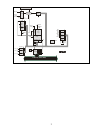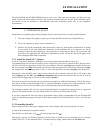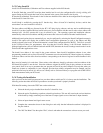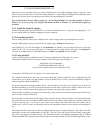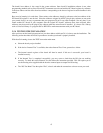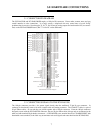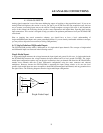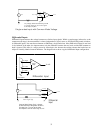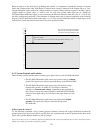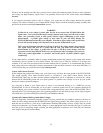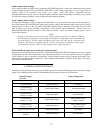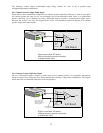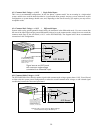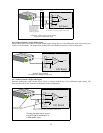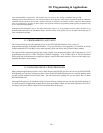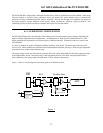
Before moving on to the discussion of grounding and isolation, it is important to explain the concepts of common
mode, and common mode range (CM Range). Common mode voltage is depicted in the diagram above as Vcm.
Though differential inputs measure the voltage between two signals, without (almost) respect to the either signal’s
voltages relative to ground, there is a limit to how far away from ground either signal can go. Though the
PCI-DAS1200 has differential inputs, it will not measure the difference between 100V and 101V as 1 Volt (in fact
the 100V would destroy the board!). This limitation or common mode range is depicted graphically in the following
diagram. The PCI-DAS1200 common mode range is +/- 10 Volts. Even in differential mode, no input signal can be
measured if it is more than 10V from the board’s low level ground (LLGND).
4.1.2 System Grounds and Isolation
There are three scenarios possible when connecting your signal source to your PCI-DAS1200 board.
1. The PCI-DAS1200 and the signal source may have the same (or common)
ground. This signal source may be connected directly to the PCI-DAS1200.
2. The PCI-DAS1200 and the signal source may have an offset voltage
between their grounds (ac and/or dc). This offset is commonly
referred to as common mode voltage. Depending on the magnitude of
this voltage, it may or may not be possible to connect the PCI-DAS1200
directly to your signal source. We will discuss this topic further in a later
section.
3. The PCI-DAS1200 and the signal source may already have isolated
grounds. This signal source may be connected directly to the
PCI-DAS1200.
Which system do you have?
Try the following experiment. Using a battery powered voltmeter*, measure the voltage (difference) between the
ground signal at your signal source and at your PC. Place one voltmeter probe on the PC ground and the other on the
signal source ground. Measure both the ac and dc Voltages.
*If you do not have access to a voltmeter, skip this experiment and take a look a the following three sections. You may be able to
identify your system type from the descriptions provided.
10
+1V
+2V
+3V
11V
+4V
-10V
+5V
-9V
+6V
-8V
+7V
-7V
+8V
-6V
+9V
-5V
+10V
-4V
+11V
-3V
+12V
-2V
+13V
-1V
Gray area represents common mode ran
g
e
Both V+ and V- must always remain within
the common mode ran
g
e relative to LL Gnd
Vcm
With Vcm= +5VDC,
+Vs must be less than +5V, or the common mode ran
g
e will be exceeded (>+10V)



